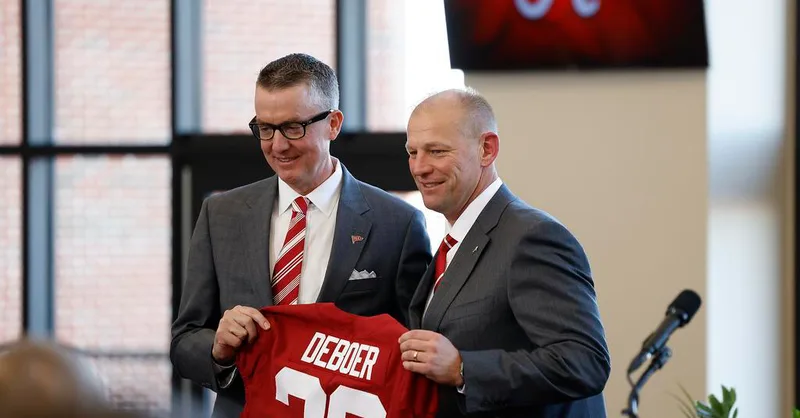In the ever-evolving world of college football, recruiting is the lifeblood of a program’s success. The ability to attract and secure top-tier talent often dictates a team’s competitiveness on the national stage. Recently, the University of Alabama made headlines when it was revealed that its football recruiting budget has nearly doubled with the arrival of Kalen DeBoer as head coach. Athletic director Greg Byrne shed light on the reasoning behind this significant investment, offering a glimpse into Alabama’s strategy to maintain its position atop college football.
For years, Alabama has been synonymous with recruiting dominance. The Crimson Tide’s unparalleled success under Nick Saban was largely built on consistently bringing in some of the nation’s best high school players. However, with the coaching transition from Saban to DeBoer, the program recognized the need to evolve its approach to recruiting to stay ahead in a rapidly changing landscape. The decision to nearly double the recruiting budget underscores a commitment to adapting to new realities while preserving Alabama’s elite status.
Greg Byrne, who has overseen Alabama’s athletics since 2017, emphasized that the increase in recruiting funds is not just about spending more—it’s about spending smarter and expanding the scope of efforts. “Recruiting today is different than it was even five years ago,” Byrne said. “The landscape is more competitive, the transfer portal has changed the game, and the expectations from recruits and their families have grown. We need to meet those demands with a robust infrastructure.”
One of the main drivers behind the expanded budget is the intensifying competition from other programs who are also ramping up their recruiting investments. Schools across the country are pouring resources into recruiting technology, scouting, travel, and staff. The rise of NIL (Name, Image, and Likeness) deals has further complicated the recruiting process, requiring programs to be more sophisticated in how they support and attract athletes. Alabama’s nearly doubled budget ensures that the Crimson Tide remains competitive not only on the field but also in the recruiting arena.
The additional funds allow Alabama to increase its recruiting footprint significantly. This means more visits to high schools, broader scouting networks, and enhanced relationships with high school coaches nationwide. The ability to be present and proactive in key recruiting hotspots is critical, especially as the talent pool spreads geographically. Byrne highlighted that Alabama aims to be the first major program to build meaningful connections with prospects early and often, leveraging the increased budget to make that possible.
Beyond geographic reach, technology and data analytics play a crucial role in modern recruiting. Alabama is investing heavily in advanced scouting software, video analysis tools, and recruiting databases. These tools help staff evaluate talent more thoroughly and make data-driven decisions. Byrne explained that this tech infusion is essential to keep pace with other elite programs that are also integrating analytics into their recruiting processes.
The expanded budget also allows for a larger and more specialized recruiting staff. Alabama is hiring additional recruiters with expertise in various regions and positions, ensuring comprehensive coverage of prospects. These recruiters not only evaluate talent but also serve as personal liaisons to athletes and their families, addressing questions and building trust. The personal touch remains vital in recruiting, even in the digital age.
Kalen DeBoer’s background played a significant role in shaping the recruiting budget increase. Known for his innovative offensive schemes and player development skills, DeBoer brings fresh energy and perspective to Alabama. Byrne noted that DeBoer’s vision aligns with a proactive, aggressive recruiting strategy that requires more resources to implement effectively. “Kalen has a clear plan for how he wants to build his roster, and that plan includes investing in the best players early and often,” Byrne said.
The budget increase also reflects Alabama’s long-term commitment to maintaining championship-level teams. Recruiting is not a one-off effort but a continuous cycle that requires sustained investment. Byrne stressed that the nearly doubled budget is a forward-looking move designed to build a foundation for sustained success under DeBoer’s leadership.
Moreover, Alabama’s recruiting strategy now incorporates an increased focus on player well-being and development beyond just signing day. The additional funds support initiatives aimed at ensuring recruits have access to top-tier facilities, academic support, mental health resources, and NIL guidance. Byrne highlighted that recruiting today is holistic—programs must offer an attractive overall experience to win over elite athletes.
Critics might question the necessity of such a large budget increase, but Byrne firmly believes that in the ultra-competitive world of college football recruiting, cutting corners is not an option. “If you want to be the best, you have to invest like the best,” he stated. Alabama’s nearly doubled recruiting budget is a declaration of intent—a promise to athletes, fans, and the college football world that the Crimson Tide will continue to set the standard.
The move also sends a message to Alabama’s rivals that the program is not resting on past laurels. Instead, it is aggressively adapting to changes and proactively positioning itself for future challenges. With the recruiting landscape more dynamic than ever, staying ahead requires bold moves and strategic investments.
In conclusion, Alabama’s decision to nearly double its recruiting budget with Kalen DeBoer at the helm is a calculated strategy to preserve the program’s elite status in college football. Greg Byrne’s explanation reveals a comprehensive approach that blends increased spending with smarter, more targeted efforts. From expanding geographic reach and investing in technology to hiring specialized staff and enhancing player support, Alabama is preparing to compete at the highest level in a new era. The Crimson Tide’s recruiting prowess has been the cornerstone of its success, and this bold budget move ensures that legacy will continue for years to come under DeBoer’s leadership.



